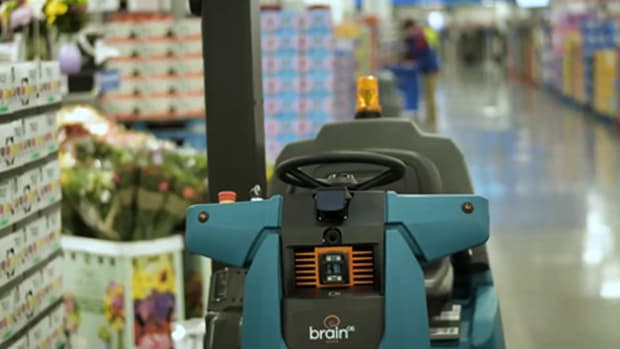Automation has loomed over all sorts of American jobs for decades. Amazon uses robots in its warehouses as does Fedex. In both cases, however, the robot workers haven't really replaced humans. In fact, while robots and automation have been used by all sorts of businesses, they have not led to widespread job loss.
That does not mean the specter of robots taking human jobs has gone away, Even though digital ordering, cleaning robots, and inventory robots have not taken a lot of jobs from flesh and blood workers does not mean that will never happen.
And, if robots do take over for human workers, it seems likely that it will happen in fields that require a lot of repetitive tasks. That makes the fast-food industry logical target automation -- and rising wages along with a shortage of workers makes the day of robots making your hamburger and fries seem even closer.
While McDonald's (MCD) and Restaurant Brands International (QSR)'s Burger King still use human workers, how much longer will that last? One rival — an iconic fast-food brand — has expanded its use of robots to make fries.

Image source: Sam's Club
Flippy, The Fry-Cooking Robot
Even though it launched in 1921, burger chain White Castle is taking things to the future and investing in fry-cooking robots. As part of its partnership with automation startup Miso Robotics, White Castle is bringing the autonomous cooking assistant known as Flippy 2 to 100 of its locations.
After testing the first generation Flippy at its Chicagoland location in 2020, the burger chain found that it could automate the more technical parts of cooking fries while human workers were left to focus on jobs like quality control and customer-facing work.
"Our partnership with Miso continues to lead the way on what’s next for back of house restaurant operations looking to empower team members with technology to better satisfy customers," White Castle's Chief Operating Officer Jeff Carper said in a statement. "Having Flippy 2 be a new hire at 100 of our White Castle locations keeps us on a path to achieve big goals at White Castle."
Automation Has Been Tried In Fast Food Before
White Castle is hardly the first fast-food restaurant to try its hand at automation — visions of burger-flipping robots date as far back as the 1960s.
In recent years, however, this once-futuristic vision has grown closer and closer to becoming mundane. After IBM (IBM) acquired McDonald's McD Tech Labs in October, the burger giant has been playing around with a series of automated drive-through lanes and ordering kiosks.
In 2020, Kentucky Fried Chicken opened a Moscow location where robotic hands place chicken orders into secure boxes while Taco Bell has also been opening more and more automated restaurants across the country.
Will McDonald's, Burger King And White Castle All Use Robots?
The definition of "robot" has shifted a lot over the decades — while many still envision humanoid metal figures like C-3PO from Star Wars, the reality is often as simple as a machine that automates tasks like taking orders or making fries.
Once you shift your definition of robot to anything that uses automation, you'll realize that they are already all over the fast-food industry.
"White Castle was the first large brand to embrace our technology and we are thrilled that our Flippy pilot made such a positive impact on their operations that they want to integrate 100 more," Mike Bell, CEO of Miso Robotics, said in a statement. "We can't wait to continue on this journey with such an outstanding partner.
McDonald's and Burger King have not moved to automated food production, but both have leaned heavily into automated order taking. App-based or kiosk-based ordering may not seem like automation but it takes a human out of the process.
So far, that has not led to either chain lowering its headcount. Instead, human workers have shifted into production and customer service. That does not mean it won't happen and Fortune's Michael Joseph suggests it's inevitable.
"Many tasks in the restaurant industry are monotonous and easily automated," he wrote. "Sharp knives, hot oil, and slippery floors do not make for the safest working environment. Using robots in operations should increase efficiency and productivity. They don’t stage walkouts or even call in sick. They can work long hours and won’t jump ship for more lucrative opportunities."
Want more from TheStreet? Sign up for one of our new newsletters to follow the electric vehicle world, the stock market, tech stocks or so much more,







